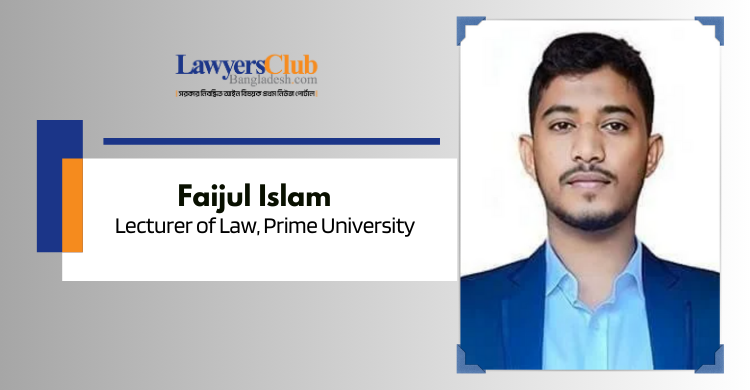The Rohingya Crisis in Bangladesh: A Forgotten dilemma on World Refugee Day

Each year, World Refugee Day serves as a reminder of the global responsibility to protect those forced to flee their homes due to conflict, persecution, good lifestyle or disaster. On this day, while the world reflects on displacement in places like Syria, Palestine, Yemen or Sudan, the prolonged plight of the Rohingya refugees in Bangladesh continues to demand urgent attention to protect the dying people.
Nearly seven years since the mass exodus of Rohingya from Myanmar’s Rakhine State in 2017, Bangladesh remains host to one of the largest and most protracted refugee situations in the world. Community Rohingya, a Muslim minority in Buddhist-majority Myanmar have long been subjected to state sponsored discrimination & being statelessness under the 1982 Citizenship Law, and cycles of violence. The turning point came in August 2017, when a brutal military crackdown—deemed a “textbook example of ethnic cleansing” by the UN—forced over 740,000 Rohingya to flee to Bangladesh, joining an already sizable population from earlier waves of persecution of death.
Bangladesh’s prompt response was initially lauded. Despite being a densely populated and resource constrained country, it opened their borders on humanitarian grounds. The Cox’s Bazar camps quickly grew into the world’s largest refugee settlement from then. However, given hospitality came with long-term socio economic, political and environmental challenges that now strain both the host communities and the state. Seven years on, the situation remains largely unchanged for Bangladesh . The Rohingya are still stateless without legal refugee status even though they have no chance to obtain refugee status and are dependent entirely on international aid solely .
Repatriation efforts have failed repeatedly, with Myanmar’s military coup in 2021 further dimming hopes of safe, voluntary, and dignified return. With no sustainable solution in sight, the crisis is evolving. Various camps have become increasingly volatile due to gang violence, arms smuggling, drug smuggling, human trafficking, and drug racket .In addition Education and livelihood opportunities remain minimal, pushing youth toward radicalisation or crime. Even environmental degradation caused by densely packed camps and deforestation has disrupted the local ecology. So tensions between host communities and refugees are on the rise. The international community which once praised Bangladesh’s generosity is now failing to meet funding pledges.
By Joint Response Plan for 2024 remains critically underfunded leading to severe cuts in food rations, healthcare services, work strategy and education programs. This neglect not only deepens the suffering of the refugees but also undermines the host country’s stability. In fact geopolitical impasse at the UN Security Council—largely due to China and Russia shielding Myanmar from meaningful sanctions—has blocked accountability and pressure mechanisms. ASEAN’s diplomacy has yielded little.
The Global North’s shifting focus to conflicts closer to home such as Ukraine or Gaza has relegated the Rohingya to the periphery of international attention to provide them proper aid. Bangladesh finds itself in a precarious position While it has repeatedly called for global burden-sharing including a way of durable solution resettlement of some Rohingya to third countries these requests have gone largely unanswered. The proposed relocation of Rohingya to Bhasan Char an island settlement, has been controversial, facing criticism over human rights concerns and lack of access for humanitarian agencies then.
Legally, Bangladesh is not a party to the 1951 Refugee Convention or optional Protocol of 1967 which complicates the legal framework for refugee protection in broader sense. However, it remains bound by customary international law and human rights obligations including the principle of non-refoulment depicting article 33 of Refugee Convention . By balancing these obligations with national security in various ways and resource concerns is becoming increasingly difficult to provide the Protection measures. On World Refugee Day 2025, the need for renewed global commitment to the Rohingya crisis is more urgent than ever in history .
A multidimensional approach is essential
Diplomatic Pressure on Myanmar: various regional and global powers must unite to hold the Myanmar junta accountable and create conditions conducive for the safe return of Rohingya to their own country
Long-Term Protection Framework: Bangladesh and its partners must work toward a legal and policy framework that grants Rohingya access to basic rights including education, movement, and work while ensuring community harmony is the prime factor for refugee protection.
Third-Country Resettlement: Willing nations must open pathways for the resettlement of the most vulnerable—orphans, widows, dying humanity and persecuted minorities.
Sustainable Funding: Foreign donor fatigue must be addressed through innovative funding strategies by public-private partnerships and greater involvement of international financial institutions
Community Engagement: Host community support is vital. Development assistance should address both refugee and local needs to avoid resentment and tension.
The Rohingya crisis is not Bangladesh’s burden alone at this moment . Literally it is a test of the international community’s commitment to justice, human rights and refugee protection all over the world. Allowing over a million people to languish in limbo indefinitely is not just a failure of policy—it is a failure of humanity towards peace and tranquility throughout the world On this World Refugee Day, let us remember that refugees are not numbers.
Eventually they are human beings with sorrowful stories, hopes, and dreams to lead a good lifestyle . The Rohingya deserve more than compassion; they deserve absolute action, justice for their identity and the right to return home in peace and dignity due to dignity is everything as a human being.
Author :Faijul Islam, Lecturer of Law, prime University of Bangladesh

